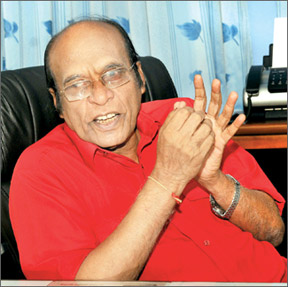|
Debate on Financial Bills:
Policy framework based on Mahinda Chintana
Text of the speech by Senior Minister of Human
Resources DEW Gunasekara at the Debate on Finance Bills in Parliament on
March 24, 2011
The Government through the budget for 2011 announced several changes
with regard to finance, tax and investment. The legislation related to
these changes is today placed before the House for approval. This is in
line with Government’s medium term policy framework based on Mahinda
Chintana. Of those bills presented within at my disposal, I propose to
restrict my comments to the amendments, relating to taxation.
|

DEW Gunasekara |
In this connection, I would like to draw the attention of the
Honourable member to some facts relating to political economy so that
they could easily comprehend the political thinking behind the proposed
legislations and the historical context in which that political thinking
was conceived.
Since 1977, Sri Lanka gradually transformed into what is now
conceptually termed as neo-liberalism under President Premadasa from
1989-1993, neo-liberalism reached its peak. Bad governance, violation of
human right trends of chauvinism both in the South and the North,
anti-Indian phobia - all commenced at the peak point of neo-liberalism
during this period.
Economic philosophy
It is our firm conviction that people of this country shall not allow
a return of Premadasa era. This does not make us believe that Premadasa
was solely responsible for those trends of thought. It was an
international factor brought about by Reagen-Thatcher based on Milton
Friedman’s economic philosophy that influenced the political thinking of
the UNP since 1977 which was put in effect vigorously under President
Premadasa.
That is why we do not believe in renaming Premadasa Stadium. We do
not forget his share of contribution to the Sri Lankan society.
Even with the change in government in 1994, we were not able to
reverse that trend due to two main factors (i) Domestically the balance
of forces within the Government and in the country. (ii) Internationally
the acceleration of neo-liberalism with the collapse of socialism in
Europe and unipolarity reaching its ascendancy.
World power
With the dawn of the 21st Century, the international factor started
changing with the rise of China as a world power, awakening of Latin
America, Democratization process in the African Continent, giant
economic strides in the continent of Asia and re-emergence of Russia, as
a political and economic factor.
It is in this historical context that the decisive shift from
neo-liberalism in the development policy framework took place in 2005
with the manifesto of Mahinda Chintana. A further shift from
neo-liberalism took place in 2010 with the manifesto of Mahinda Chintana
- Vision for the future.
The result was that the State Sector role in the market economy was
enhanced. The ideology of neo-liberalism otherwise known as ‘small
government’ took the back seat.
We must understand that even after 2005, the market-orientation
continued and will continue but subject to necessary regulations and
policy-based taxes or subsidies. The State has now been made to acquire
a greater leadership role in the economy, a leading role in
infrastructure development investments. Public employment programs have
been implemented. Privatization of State-owned enterprises was abandoned
as a policy. The Government intervention was considered necessary and
desirable.
Government revenue
We were not prepared to accept IMF prescriptions like Structural
Adjustment Facilities etc.
In this context, we are required to effect changes in tax policy, tax
laws and tax administration.
Under neo-liberalism Sri Lanka’s tax capacity started declining. The
government revenue as 25 percent of the GDP in 1977 was reduced to 13
percent by 2004. Despite our war on terrorism, despite global crises in
food, energy and also financial and economic crises, we were able to
raise the Government revenue to 15 percent by now.
We have reversed the downward trend in Government revenues in general
and in tax revenue in particular. That is an achievement, reversing the
trend which started operating since 1978. So, with reforms in tax
policy, tax laws and tax administration, we hope to raise the Government
revenue to a higher level. If the revenue can be raised, we will be able
to accelerate significantly the socio-economic development.
Tax policy
We must remember, at low levels of development, the tax structure is
bound to have a bias towards concentration in indirect taxes. This needs
change because burdens of indirect taxes generally fall on the working
people. Emphasis on direct taxes is necessary and desirable.
Under the new economic policy of UPFA, the new tax policy has several
socio-economic objectives - (i) Revenue collection, redistribution of
income, macro-economic control, protection of industry, economic growth,
restraining of undesirable elements of consumption, and so on.
Our principles of taxation are equity, progressivity, simplicity,
efficiency and so on.
In order to realize the objectives of the Government, it is necessary
to reorient and streamline the tax policy, tax laws and tax
administration.
To give effect to these changes, a greater share of responsibility
has to be borne by the Inland Revenue Department.
Inland Revenue Department
The Head of the then Taxation Commission Prof Nicholas Kaldoor once
remarked that a tax officer should be professionally an economist, a
lawyer and an accountant.
The Inland Revenue Department at that time was the most prestigious
Department of highest integrity, calibre, professionalism, tax payer
friendly.
I am as a former tax officer, proud to have been a product of that
Department which moulded my outlook.
I wonder whether the Department still enjoys that privileged and
prestigious position. I cannot shift the blame on to the tax officers in
general. Society has failed to turn out such products for the
Department.
Time is ripe for a change. I hope that the recommendations of the new
Taxation Commission will pave way for this change. |



